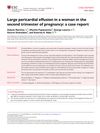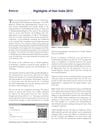 4 citations,
January 2016 in “PubMed”
4 citations,
January 2016 in “PubMed” The best way to treat androgenetic alopecia, a common type of hair loss, is through early intervention and a comprehensive approach, but some supplements may reduce the effectiveness of medical treatments.
 November 2017 in “Pediatrics in Review”
November 2017 in “Pediatrics in Review” A 4-year-old girl with hair loss was diagnosed with early-onset trichotillomania and improved with behavioral interventions.
April 2022 in “Urology Practice” Early intervention for acute urinary retention can reduce costs and improve care.
 February 2024 in “European heart journal. Case reports”
February 2024 in “European heart journal. Case reports” Early surgical intervention and a multidisciplinary approach are crucial for managing complex cardio-obstetric patients.
Early and precise nutritional intervention is crucial for managing anorexia nervosa.
 4 citations,
March 2009 in “British Journal of Dermatology”
4 citations,
March 2009 in “British Journal of Dermatology” The conference highlighted new dermatological treatments and emphasized early intervention and addressing conditions lacking evidence-based treatments.
 August 2012 in “Journal of Evidence-Based Medicine”
August 2012 in “Journal of Evidence-Based Medicine” The issue included new and updated reviews on various health interventions, with significant findings on weight loss, psychological therapies, cancer treatment, and more.
 May 2014 in “Journal of Aesthetic Nursing”
May 2014 in “Journal of Aesthetic Nursing” Health Education England is moving forward with phase two of their cosmetic intervention project after a successful summit and plans for future training standards.
 August 2000 in “ChemInform”
August 2000 in “ChemInform” Effective treatments for hair loss exist; early intervention is important.
 27 citations,
September 2017 in “Journal of Investigative Dermatology Symposium Proceedings”
27 citations,
September 2017 in “Journal of Investigative Dermatology Symposium Proceedings” Hair loss in black women needs more research, early intervention, and community education.
 December 1920 in “The Lancet”
December 1920 in “The Lancet” The document discusses various public health initiatives and societal issues, emphasizing early intervention and support.
November 2021 in “Frontiers in Genetics” The FAW-FS algorithm improves depression recognition, and psychological interventions help AGA patients' mental health.
 23 citations,
January 2013 in “Indian Journal of Dermatology, Venereology and Leprology”
23 citations,
January 2013 in “Indian Journal of Dermatology, Venereology and Leprology” FPHL causes hair loss in women due to genetics and hormones; minoxidil and anti-androgens are treatments, and early intervention is advised.
23 citations,
October 1996 in “Dermatologic clinics” Genes affect cytokine production, which can influence chronic diseases, and certain interventions may help prevent related molecular damage.
 16 citations,
July 2020 in “Health and Quality of Life Outcomes”
16 citations,
July 2020 in “Health and Quality of Life Outcomes” Women with Polycystic Ovary Syndrome (PCOS) have a lower health-related quality of life, especially those with an anovulatory phenotype, and may need specific interventions to improve it.
 7 citations,
October 2020 in “Journal of Clinical Medicine”
7 citations,
October 2020 in “Journal of Clinical Medicine” Women with PCOS are at high risk of glucose metabolism issues and heart diseases, especially if overweight, highlighting the need for early intervention.
 3 citations,
March 2021 in “Journal of Pediatric and Adolescent Gynecology”
3 citations,
March 2021 in “Journal of Pediatric and Adolescent Gynecology” Girls with Pilonidal Disease are more likely to have Polycystic Ovarian Syndrome, and treating PCOS may reduce the need for PD intervention.

Women with Polycystic Ovary Syndrome (PCOS) have a lower health-related quality of life, especially those with an anovulatory phenotype, and need specific interventions to improve it.
 March 2021 in “The British Journal of Psychiatry”
March 2021 in “The British Journal of Psychiatry” Countries with stricter cultures had fewer COVID-19 cases and deaths, paranoia is linked to false memories, psychosocial intervention works as well with or without antipsychotic drugs for young people with psychosis, smartphones can detect changes in behavior indicating illness relapse, and recruitment agents show regional and gender biases.
 January 2001 in “Cambridge University Press eBooks”
January 2001 in “Cambridge University Press eBooks” Early signs of PCOS in girls, like irregular periods and polycystic ovaries, suggest a need for early diagnosis and intervention to prevent further health issues.
 January 1982 in “Journal of The American Academy of Dermatology”
January 1982 in “Journal of The American Academy of Dermatology” Experts discussed treatments for skin conditions in children, emphasizing hydration, cautious medication use, and early intervention for infections.

Female pattern hair loss, common in women, can be treated with various methods like minoxidil, anti-androgen treatments, and light therapy, but early intervention and realistic expectations are crucial.
 July 2003 in “Journal of Cutaneous Medicine and Surgery”
July 2003 in “Journal of Cutaneous Medicine and Surgery” Various skin conditions like cutaneous lupus erythematosus, psoriasis, and basal cell carcinoma can be effectively treated with antihypertensive agents, NB-UVB phototherapy, and imiquimod cream respectively. Vaccines are effective against genital herpes and HPV-16 infection. Early intervention is crucial for conditions like diabetic foot ulcers and neonatal herpes. Certain dyes can cause hand dermatitis, and there's a link between smoking/drinking and psoriasis in men. No direct link was found between low iron levels and chronic hair loss in women.
2 citations,
November 2018 in “Seminars in Cutaneous Medicine and Surgery” Combining different treatments works best for female hair loss.
 1 citations,
January 2012 in “International Journal of Trichology”
1 citations,
January 2012 in “International Journal of Trichology” Hair India 2012 was a successful international event focused on combating fake trichology practices and discussing various hair health topics.
 June 2023 in “International journal on recent and innovation trends in computing and communication”
June 2023 in “International journal on recent and innovation trends in computing and communication” Combining multiple algorithms predicts hair fall more accurately than using single algorithms.
January 2020 in “Dermatology Review” Early diagnosis and treatment are crucial for managing alopecia areata, morphea, and psoriasis.
 July 2023 in “Journal of Cosmetic Dermatology”
July 2023 in “Journal of Cosmetic Dermatology” Practitioners treating hair loss need better education and resources to overcome challenges like commercial bias and ethical dilemmas.
 4025 citations,
December 2003 in “Human Reproduction”
4025 citations,
December 2003 in “Human Reproduction” The 2003 consensus updated PCOS diagnosis criteria and linked PCOS to higher risks of diabetes and heart problems, recommending lifestyle changes to lower these risks.
 1265 citations,
October 2013 in “The Journal of Clinical Endocrinology and Metabolism”
1265 citations,
October 2013 in “The Journal of Clinical Endocrinology and Metabolism” The guideline suggests using specific criteria to diagnose PCOS, recommends various treatments for its symptoms, and advises screening for related health issues.























